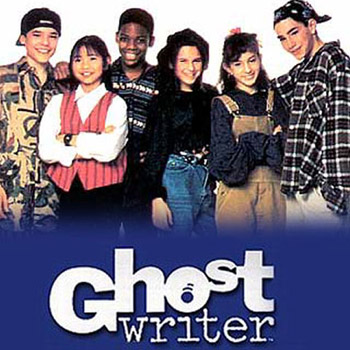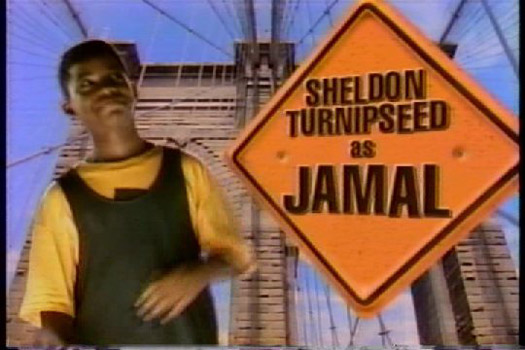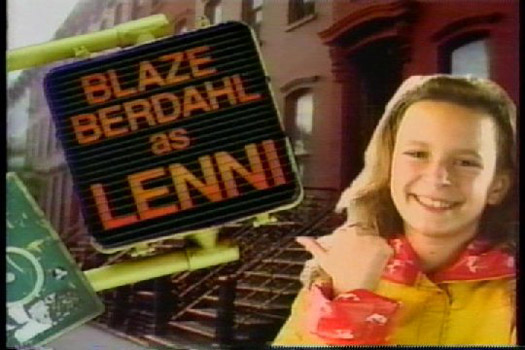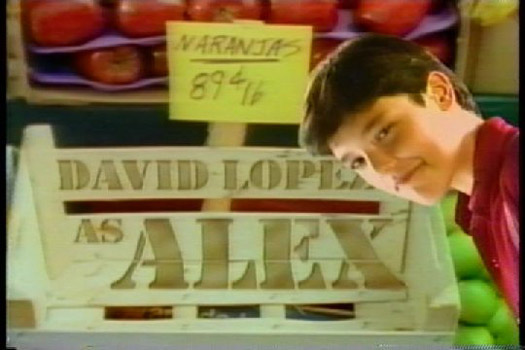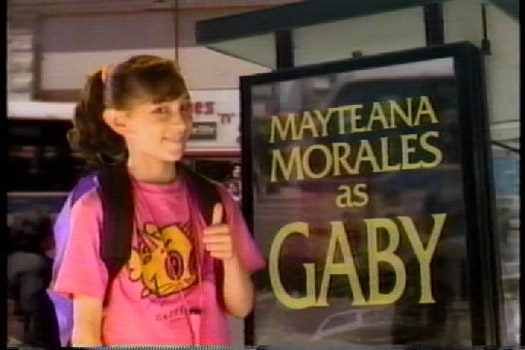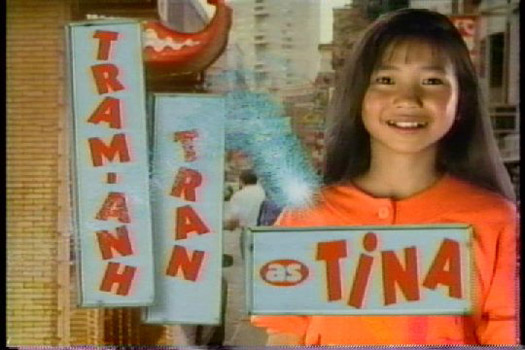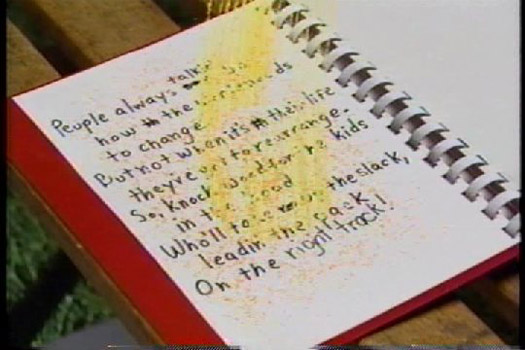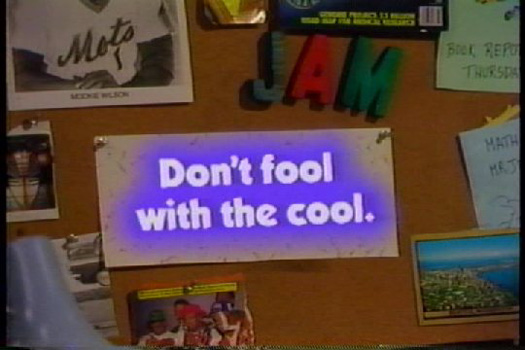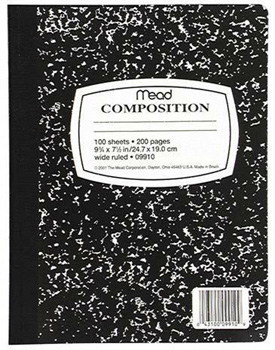|
Grab Your Casebooks 'Cause The Ghostwriter Team is on the Case! - Ghostwriter By: PoisonRamune, the Apathetic Lizardman If you’re relatively in the same age group as the RwN staff and had a less than cool childhood, then you’re probably more than familiar with the PBS/BBC preteen edutainment show, Ghostwriter. Recently, I had stumbled upon a youtube channel with nearly every episode uploaded to it and I found myself wasting a lot of free time rewatching old story arcs and even watching ones that I had missed from my youth. All in all it was pretty neat revisiting such a quirky show that stuck with so many of my friends and our generation as a whole; to the point where the RwN inside joke of saying “Ghostwriter...” and anticipating someone to reply with “WORD!” has proven to be a very well recognized joke/meme with most people we’ve come across.
In case you’re one of our younger readers (or older readers) or were just too cool to care about learning at that age. Ghostwriter was a mystery series that was produced in 1992 - 1995 by the Children’s Television Workshop in an effort to promote literacy and critical thinking skills to preteens and younger teens. The series focused on a small group of friends of various backgrounds and ethnicities as they attempted to solve cases and work out problems ranging from: winning a riddle based scavenger hunt to exposing a toxic waste company that had dumped poisons into their neighborhood.
The team finds help and “friendship” from the titular Ghostwriter, a specter who communicates through written words that only the children can see. Ghostwriter’s main role on the team is using its ghost/apparition like qualities to access places that the children would normally be unable to go and gather written clues/evidence from the area. Because of this, not only were many mysteries done in the standard whodunit format; Ghostwriter’s powers also opened up a different type of mystery where the children would know who was to blame, but would need to gather physical evidence to reinforce the information gathered by him. While the Ghostwriter Team seems like a cliché mimeograph of those uber culturally diverse cliques found in every 90’s kids shows (since I guess people just started realizing that not everyone in the world was black or white), they actually dodged a lot of the cultural clichés pretty well.
Jamal Jenkins, the team’s leader seems as if he’s going to be the token black kid with his weird love of Cross Culture clothing (I’ll admit, I got my mom to buy me a CC shirt because of Ghostwriter) and the red, yellow and green motif; however, he actually turns the stereotype on its head as he’s probably the dorkiest black kid you’ll ever meet, aside from our friend Froguin (in the end of the series he even gets accepted to some prestigious preparatory school). Jamal lives with his father who in one episode was played by Samuel L Jackson (no bull, check out the “Ghost Story” arc), his grandmother who’s 100 times cooler than him and his mom who seems to act more like his sister. He’s seemingly the voice of reason for the team often going by logic over emotion (and I guess if you lived with a crazy family like Jamal’s, you’d be trying to be a beacon of sanity too), as evidenced in the “Get the Message” story arc where Jamal refused to side with either Lenni or Alex and sought to find out what really occurred.
Lenni Frazier is the team’s fashionista and resident rapper. Lenni is another one of those characters that throws clichés to the curb since she’s either white or Jewish (which I assume since she vaguely mentions a contemporary Jewish ritual when talking about her mom passing on). She lives with her single father, a sort of upbeat semi-stoney musician who eventually starts dating some British left winger that Lenni considers a role model. Lenni perfectly embodies the concept of being cool in the early 90’s (where people used to randomly make an outfit by mixing clothing from various styles). Her style is this weird mix of mock African kaftans, augmented by whatever she can pull out of her and her father’s closet. Thus she’s normally seen in a tribal looking hat or kerchief, loud oversized T-shirt and leggings.
Alejandro (Alex) Fernandez fills the “friendly foreigner” spot on the team. Being a first generation immigrant from El Salvador, Alex kind of falls into this role in the very typical way as he: has a father whose ideals feel locked in with the “old country” and often will speak Spanish/Spanglish when emotional. While the writers did have Alex sort of rooted in the conventional, they also worked very hard keeping him from being like a Cousin Balki. It’s commendable that they wrote Alex as one of the more popular kids in his school as opposed to a naïve FOB no one cared about. Aside from the facets that would make an Arizona cop question whether Alex was here legally or not, he’s pretty much a typical preteen. He excels at basketball, helps in his parents’ bodega (say it with me kids “bo-dega”) after class and is the envy of his peers with his extensive list of female pen pals (yes, this was set in 1992. Today, it would be an extensive list of chat friends and it wouldn’t actually be seen as cool). While the 3 older regulars seem to do everything in their power to not fall into the pitfalls of the cliché, the 2 youngest characters feel very cookie cutter and seem to be there as archetypes for kids who were probably forced to watch this show by their parents/teachers/older sibling (as opposed to the losers that actively wanted to see this show) to relate to.
Gabriella (Gaby) Fernandez is Alex’s younger sister and was probably on the show to give our younger siblings a character to relate to, keeping them from whining about watching some edutainment show. More often than not the plot mechanics that specifically involved her were entirely based on the fact that she’s Alex’s sister and rarely does she ever have a moment in the show that defines her as an individual (however, the “Am I Blue?” story arc does heavily revolve around her, though most of the direct concern is the fact that what she’s doing is affecting the entire Fernandez household). In spite of this, Gaby does seem to have the closest relationship with Ghostwriter as she has shown genuine concern for his well being during several intense moments in the series and has even gone as far to try to create a safe haven for Ghostwriter during the “Max Mouse” episodes in which Ghostwriter seemed in genuine danger. Towards the end of the show’s run Gaby becomes a victim of the Darren Stephens phenomenon (in which she is played by a totally different actress). While it is kind of off putting to see a wildly new Gaby, it also doesn’t really affect much considering no one really liked her character anyhow and that the change was made with only 8 episodes left to go.
Tina Nguyen is the member of the team with the overly traditionalist family. I assume her purpose on the show was to give all my friends and I a character we could relate to. Her home life was the opposite of having neglectful alcoholic/crack addicted parents, but equally as sucky in that her parents seemed to care about her too much. As her unpronounceable last name would suggest, Tina is a Vietnamese American born to immigrant parents. Aside being heavily into academics and her studies (as evidenced by the fact that she has to lie to her mom by saying she’s going to study whenever she wants to work on a case with the team), she also has interests in acting and video production which plays a major part in many of the cases. Often times Tina will be doing a taping for an unrelated project and a piece of evidence from a case the team’s working on will show up in her videos or other times she uses her access to the A/V equipment to perform hidden camera stings. During the later half of the series Alex and Tina develop a very light relationship that doesn’t really go anywhere, but does give the show another life point to tackle (young relationships). Rob Baker and Hector Carrero both serve as the “sixth man” (at various times, naturally). Rob was a military brat who was reluctant to join the team as he’d always have to move to a new town whenever he’d start making friends. His character development was pretty cool to watch during the series, as he went from a helpful outsider to a trusted and integral member of the Ghostwriter team. Oddly enough, Rob fulfills the role of generic white boy during his run (with the writers even making a joke on this with him considering himself more of a “pink/peach guy”). Most of the story arcs that revolve around him focus on him taking very impulsive and downright retarded risks such as: sneaking into a gang hideout, chasing a dangerous suspect alone, or wandering into an abandoned railway tunnel. Despite his blatant stupidity, Rob is often the character to put 2 and 2 together first, which I can only assume comes from his life experiences living in various parts of the world and his desire to be a professional writer (since most of these cases are based on facets of literacy). While Rob played a true sixth man in the show, Hector also had the role of being a Cousin Oliver type character (a young character written onto a show with an “aging” cast to bring back the show’s original youth appeal) to go along with his Poochie like duties. Hector was sort of the polar opposite of Rob, he was without a doubt the weakest writer on the Ghostwriter team and his reading comprehension was a total joke. Worst yet was the fact that Hector was basically a mini-me of Alex being an athletic kid from Puerto Rico. In fact, during his stay on the series Hector almost always appears with Alex as some sort of modular unit, since Alex is mentoring Hector as a part of the “One on One” program (a play on Big Brothers of America). I find it a bit sad that Hector’s character even exists at all; since he was basically written on to replace Todd Alexander (the actor that played Rob) who was being kicked off the show for breaking his contract with PBS by starring in a commercial for Kool-Aid or something.
Along with teaching kids the power of reading and writing, each story arc also had a side lesson which always seemed to carefully caress the line between academic and life skills. There are subtle lessons about: cause and effect, the power of advertising, and even an intro to the internet including a lesson on web community safety (give them a break; this was 1993, a time where there were no minors online). I truly feel that this was a testament to the quality of the writing and production of this show, since the show’s creators made it so kids were learning things near constantly while watching this, even when they didn’t even realize it. The show’s format was also very innovative as each story arc was composed of 4-5 episodes and played out much like a made for TV movie. Aside from the main mystery found in every show, each story arc had several B stories that dealt with numerous social issues such as: homelessness, drug abuse/addiction, racism, divorce, the death of a loved one, etc. Another really cool part of the show was the amount of top tier (at the time the show was being produced) actors and actresses that would make cameo appearances, which is something you don’t really see on educational shows now-a-days. As mentioned before the legendary Samuel L. Jackson had once played Jamal’s father; however, the show had many other very famous guests stars including: Spike Lee, Daisy Fuentes, Michael J. Fox, Harry Connick Jr. and Judge Reinhold (oh wait, he was always kind of second tier). The show was obviously written for the under 12 crowd and is a bit laughable when watching it as an adult, especially when watching these kids spend 5-10 minutes trying to connect 2 blatantly related pieces of evidence or whenever they write anything down (including notes to their parents that simply say “I’ll be at a friend’s house”). And due to the heavy censorship regarding direct person to person violence on PBS, most of the action is limited to people gently shoving each other, telegraphed punches that look faker than anything seen in the cheesiest of pro wrestling matches, and criminals literally getting tripped by someone sticking their foot out in front of them so the cops can apprehend them. In many ways, the juvenile suspense and situations make the show very hokey and admittedly a bit hard to watch without being angry or frustrated with the Ghostwriter team’s incompetence at times. However, despite having to play to the lowest common denominator and being a bit on the campy side; Ghostwriter also does an excellent job at invoking emotional responses from the audience and creating genuine suspense even while working within these restrained parameters.
Watching Ghostwriter now kind of puts you in a sort of time warp as the show is obviously set in the 1990s. Nearly all the music done in the show is hip-hop (something that was thought to be the definitive music genre at the time) and nearly every series arc has a rap song of some sort (most of the time performed by Lenni). The show also dates itself with archaic ideas and devices such as the kids having to use an actual card catalog to do research at the library. Above all, the dialogue and quotes from the series truly set the show in the early 90’s with gems such as “You go boy!” or “Don’t try to play me out, fool.” However, even though the show is clearly set 17 years in the past, the points they try to teach are just as relevant today as they ever were (in fact, I think I actually made a pro and con chart like Jamal's when I was car shopping the other day). Though, I will admit that a good deal of Ghostwriter’s powers would be made obsolete with the advent of google (and the net in general) and SMS capabilities/mobile phones.
Despite achieving critical acclaim and being regarded as some of the one of best edutainment shows that television had to offer by its fans, the show met an abrupt end in the middle of the third season. There was no farewell episode or even subplots that would tie up the loose ends in the series, it was like they simply ran out of funding to keep the show going (which I actually read was rumored to have happened). Though it did seem like the show was eventually going to hit a close by the end of the third season, since the older kids were on the verge of entering high school. Therefore, the Children’s Television Workshop would probably have to recast most of the team to keep the show alive anyhow. Speaking of keeping the show alive, in 1997 CBS tried to revive the Ghostwriter franchise by producing a sequel series called The New Ghostwriter Mysteries. The new format deviated heavily from the classic Ghostwriter formula by presenting a case per episode, changing out a lot of the team dynamics and drastically changing Ghostwriter’s “physical” properties. Needless to say the show didn’t garner much appeal and was actually dropped by CBS after only 13 episodes (nice try, losers).
|
